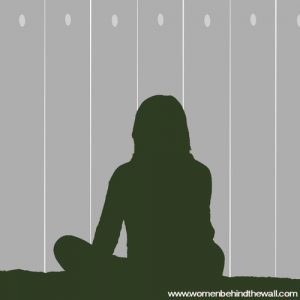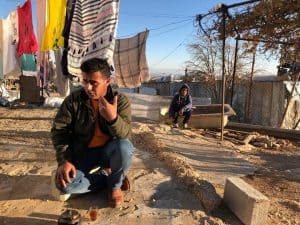 Podcast Episode #5: A Barrier to Families
Podcast Episode #5: A Barrier to Families
The Women Behind the Wall podcast highlights female voices from the Holy Land, and is hosted and produced solely by women who live and work in Jerusalem. The podcast seeks to amplify minority voices and perspectives, especially women’s experiences in the private sphere as it is affected by the public sphere. We hope you’ll join us here on Thursdays as we highlight each episode.
Listen to Episode #5: A Barrier to Families here
Some may refer to the wall Israel built as a security fence, but when it segregates people from each other, there is no way to describe it other than by separation; a physical barrier to families, an impediment to freedom of movement. In episode five of Women Behind the Wall podcast, listeners are introduced to some of the legal status issues facing Palestinians in East Jerusalem and those in the West Bank.
Sara is a Christian Jerusalemite Palestinian with an Israeli identification card and residency status. Her family house ended up 10 meters from the route of the separation wall but was excluded from its previous designation in Jerusalem. So while she has a Jerusalem ID, her children, all of whom were born in Jerusalem, were not granted the ID cards at birth.
Nearly forty percent of the population of Jerusalem includes Palestinians, and they live under a different set of rules and restrictions than Palestinians living in the West Bank. Sara’s husband, for example, has a Palestinian (West Bank) ID because he lives in Bethlehem. For Sara to keep her Jerusalem ID and pass this status onto her children, she must remain in Jerusalem. Therefore, the couple cannot live in the same home together as a family.
Some may refer to the wall Israel built as a security fence, but when it segregates people from each other, there is no way to describe it other than by separation.
For her husband to visit her and their children, he must apply for permission from the Israeli government. Often, Israel grants him a day permit, which means he is not allowed to spend the night and must go back to the West Bank before a specified time each night. He could face a massive fine and be arrested if he is even five minutes late for this curfew. This restriction is a common occurrence, as Israel issues many permits for a set time with specific hours or days indicated. Sometimes, his applications are denied, and there is no guarantee for the next permit. It is a constant question of access and stability in the family.
The reality of the occupation and system of permits separates countless families just like Sara’s. For the birth of her first and third children, her husband got permission to come to Jerusalem, but not during the birth of her second child. It took ten days before his permit was granted to visit Sara and their newborn baby.
Sara shares about the frustration of the impact on daily life. How it takes her an hour or more to get the children to school because her husband does not have permission and could not help with this daily family task. She speaks about the difficulty in basic things like sharing meals. Her life has been split, traveling back and forth to bring him food, clean his house, and wash his clothes, then cross back into Jerusalem to do the same thing at her home.
Her husband’s family owns land in the West Bank, which is surrounded by Israeli settlements where only Jewish Israelis live. While settlers are allowed to build and expand the settlements, Sara’s family is not allowed to do the same on the land that they legally own: “Because we are Arab, we can’t build there.” Palestinian property owners in Jerusalem and the West Bank are often not granted permission to build on their private land, while surrounding West Bank areas have many growing towns, designated only for Jewish people and communities.
Sara shares about the variety of trees on her family farm and expresses what the trees mean to Palestinians: “When you plant a tree, the trees become like your child. When you every day, water it, it becomes bigger.”
There is also the threat of violence on the land from the neighboring settlers who are protected by the Israeli Defense Force. But Sara teaches her children, “Our God teach us to love each other, to be good with our enemies… I feel that there are kind people and good people in Muslims, Jews, and Christians. And there are bad people in Christians and Jewish and the Muslims. So, we have to be kind, for everyone, and to love each other.”
Sara wants others outside of the Holy Land to understand she simply wants basic human rights, for herself, her husband, and her children.
God, we ask for you to break down the walls in between your creation; the barriers that stand between families, communities, and reconciliation. We pray for Sara, her family, and every family that has experienced separation. We ask for unity in the Holy Land towards peace and justice for all. Amen.
CSA is grateful to our friends at Churches for Middle East Peace for reprint permissions.


